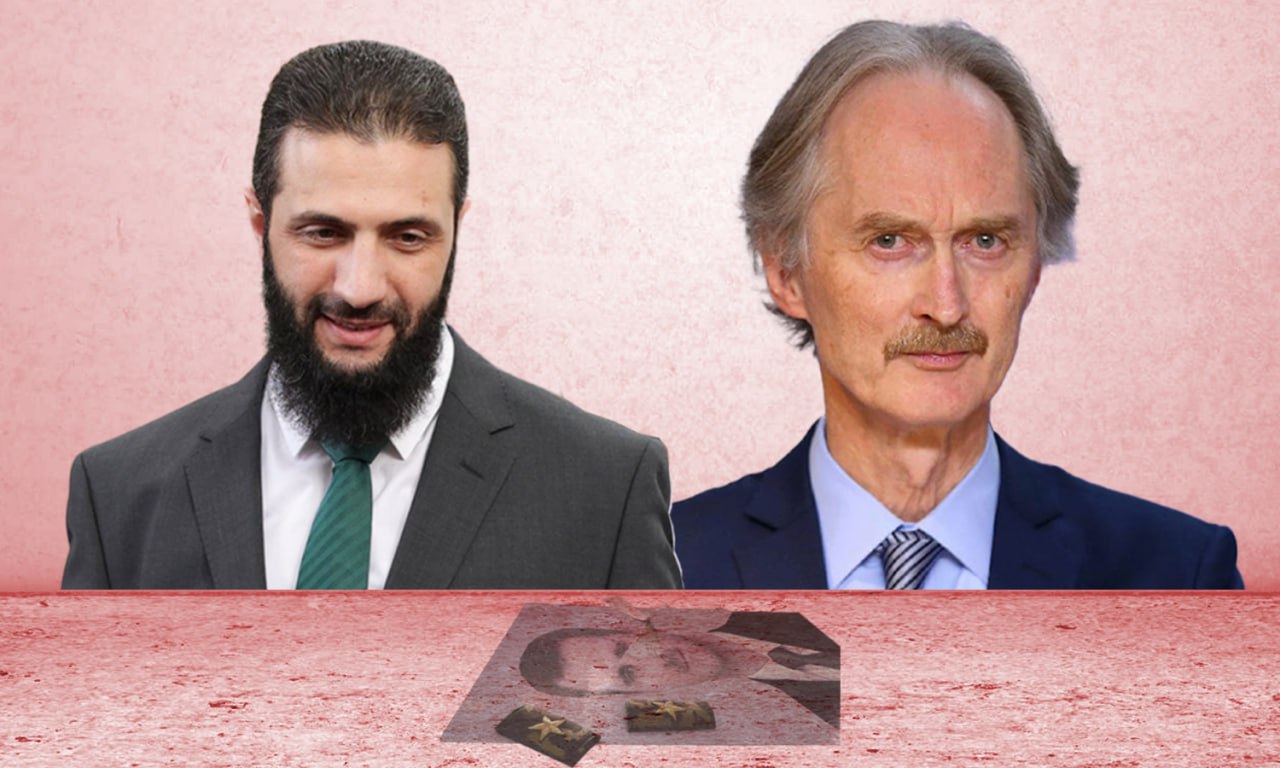


After the fall of the ousted Syrian regime, the UN resolution 2254 remains uncertain amid discussions about amendments needed to the resolution in line with the political developments in Syria (Modified by Enab Baladi)


Hussam al-Mahmoud | Ali Darwish | Khaled al-Jeratli
The UN resolution 2254 remained a victim of the obstinacy of the previous Syrian regime and its evasion from applying its clauses, which essentially focus on forming a transitional governing body in Syria.
With the ousted president, Bashar al-Assad, fleeing and his regime collapsing on December 8, the discussion about Syria’s political future has returned, which the UN resolution 2254 was supposed to shape nearly nine years ago.
International and Arab entities are calling for the resolution to be referenced as a map for the political future of Syria, viewing it as a pathway to restore stability in Syria. The completion of the transition from Assad’s Syria to a new Syria is linked to the application of this resolution, which mentions political transition in just one of its clauses.
Meanwhile, the interim government in Damascus is cautious about its clauses, taking into account that the existing resolution to resolve the conflict between two parties is no longer applicable in its literal form after the role of one of these parties, the previous regime, has ended, as its president escaped to Moscow and most of its senior officials fled abroad.
The resolution is also a point of contention among opposition factions from the Syrian Negotiation Commission, the Syrian National Coalition, and the General Command that has taken over the governance in Damascus, albeit no explicit disagreements have been announced.
Enab Baladi discusses in this report the disagreement over the application of the resolution and explores with experts and researchers the future of this resolution and its potential impacts, factors governing its enforcement, and the future and image of governance in Syria thereafter.
The Western desire for a smooth power transition in Syria is linked to the UN resolution 2254, which has recently been echoed by international representatives, as noted by Arab officials when discussing the transformation witnessed in Syria after the fall of the ousted president Bashar al-Assad and the opposition taking over governance in Damascus.
The resolution 2254 was adopted in UN Security Council session No. 7588, held on December 18, 2015. It affirmed at the beginning its commitment to Syria’s sovereignty, independence, unity, and territorial integrity, along with the objectives and principles of the UN Charter.
The resolution, which included 16 clauses, endorsed the Geneva Statement and the Vienna Statements as a foundation for achieving any political transition in Syria through a Syrian-led political process, and reiterated, in some of its clauses, the necessity of an immediate ceasefire, except for factions listed as “terrorist organizations” at the time, namely the Islamic State and al-Nusra Front, which later distanced itself from al-Qaeda to evolve through several stages into the Hayat Tahrir al-Sham (HTS), which today leads the opposition towards the presidential palace in Damascus.
As a final stage, the UN resolution spoke about the need to establish a transitional government in Syria for a duration of 18 months, and to hold a national dialogue involving the Syrians, prepare a new constitution for the country, and allow humanitarian agencies and international organizations access to affected areas, assisting the harmed Syrians.
The political transition process that the UN resolution 2254 has swiftly undergone is elaborated more expansively by the Geneva Statement, as it encompasses Security Council resolutions 2042 and 2043, which call for an immediate and permanent ceasefire, intensification of the release of detainees, and provision of information related to them.
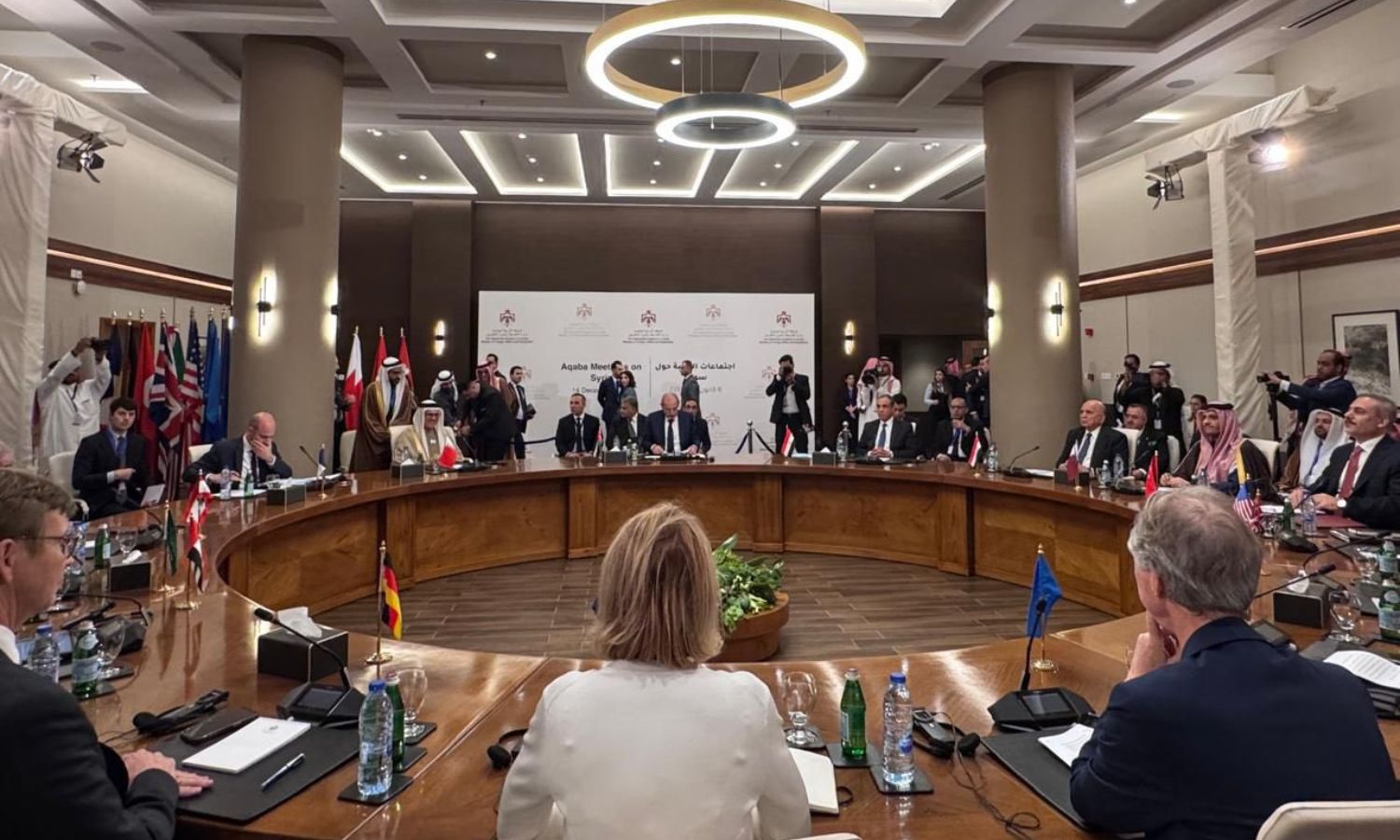
The parties participating in the Aqaba meeting focused on supporting Syria during the transitional period – December 14, 2024 (Jordanian Foreign Ministry/X)
The resolutions speak about ensuring freedom of movement for journalists in Syrian territories, granting them visas under a non-discriminatory policy, respecting freedom of assembly, the right to peaceful protests, and ensuring the safety and security of the UN mission and cooperating with it to facilitate its tasks.
The Geneva Statement outlines four steps to achieve political transition based on:
The Geneva Statement also separately discusses practical steps to achieve a peaceful transition, which are outlined in five points:
Days after the fall of the Assad regime, the parties announced their positions on the political process in Syria. The commander of the Military Operations Administration, Ahmed al-Sharaa, called for updating the UN resolution 2254 after it was mentioned in the Aqaba Statement to foreign ministers of Arab countries, in the presence of Western officials, hoping for progress in the political process in Syria based on the same resolution.
For its part, the Syrian Negotiation Commission, which is concerned with conducting negotiations with the ousted regime according to the UN resolutions, believes that there still remains a role for the National Coalition in Syria after the fall of al-Assad, as it is considered a key political body formed to lead negotiations for a political solution. This was previously stated by the vice president of the Syrian National Coalition, Dima Moussa, during her discussion with Enab Baladi.
Moussa added that despite the changes in the military and political landscape, the National Coalition still has an important role in the transitional phase and should be part of the Syrian dialogue aimed at representing all political, religious, and societal spectra.
She noted that the resolution 2254 referred to two main parties, namely the opposition and the regime, and the reality changed with the fall of the regime. However, the essence of the resolution speaks about “granting Syrians the right to determine their destiny based on a Syrian-Syrian dialogue.”
She asserted that the outlines of a power transition process are embedded in “2254,” and the specifications of the transitional governing body and its tasks are detailed more in the Geneva Statement.
The UN resolutions were based on the premise that “2254” was in place between the regime and the opposition, while the first party of the equation has now fallen, and the opposition with its various factions is responsible for implementing the remaining conditions, which has left the mechanisms available for the resolution’s application with a gap that may require some time to resolve.
On the other hand, fundamental changes occurred within the al-Nusra Front faction mentioned in the UN resolution, as the US pursuit against its leader, Ahmed al-Sharaa, was lifted, who seemed closer to western expectations since his faction (Hayat Tahrir al-Sham) moved towards Aleppo on October 27.
These contentious points remain open to scenarios at a time when the parties do not clearly articulate their expectations regarding the mechanism for application.
On December 15, Ahmed al-Sharaa called for updating the UN resolution 2254 concerning the political transition in Syria during his meeting with the UN special envoy to Syria, Geir Pedersen.
The Syrian National Coalition, which has been considered the legitimate representative of the Syrian opposition in international forums over the past years, supported the move towards “2254,” which raised the ire of Syrian activists.
The Damascus government has not responded to Enab Baladi‘s inquiries regarding its reservations about the application of “2254” up to the moment of preparing this report, nor what points it is requesting to update.
From the perspective of Dr. Ahmad Qurabi, a researcher at the Syrian Dialogue Center, amending “2254” is a possible option, but it is not imminent.
He told Enab Baladi that the current context precludes this proposal, as the resolution focuses on the Geneva Statement which was issued 15 months after the Syrian revolution and still maintains its content. Additionally, indicators from the new administration in Syria suggest a move towards a national conference.
Should the proposed national conference succeed, there would be no need to issue or update any resolution related to the political process in Syria, and it can be said that the political process is being conducted with Syrian ownership, as stipulated in the Geneva Statement.
Qurabi did not rule out the failure of the national dialogue conference, but he anticipated new UN resolutions in this case, with intervention from active countries in the Syrian file, especially if they were not convinced of comprehensive representation of political forces and the Syrian civil society in this national conference.
He believes that the fundamental principles underlying “2254” and outlined in the Geneva Statement are crucial for achieving a sound political process in Syria, not the UN resolution itself.
He added that the ousted regime was the one obstructing the application of the principles of the Geneva Statement and was obstinate in implementing the resolution 2254. However, it made everyone aware that there is no solution in Syria except through a political process. Meanwhile, the arrival of the new administration in Damascus is expected to provide an opportunity for implementing the political path leading towards these essential principles, which is a Syrian demand before being a UN demand.
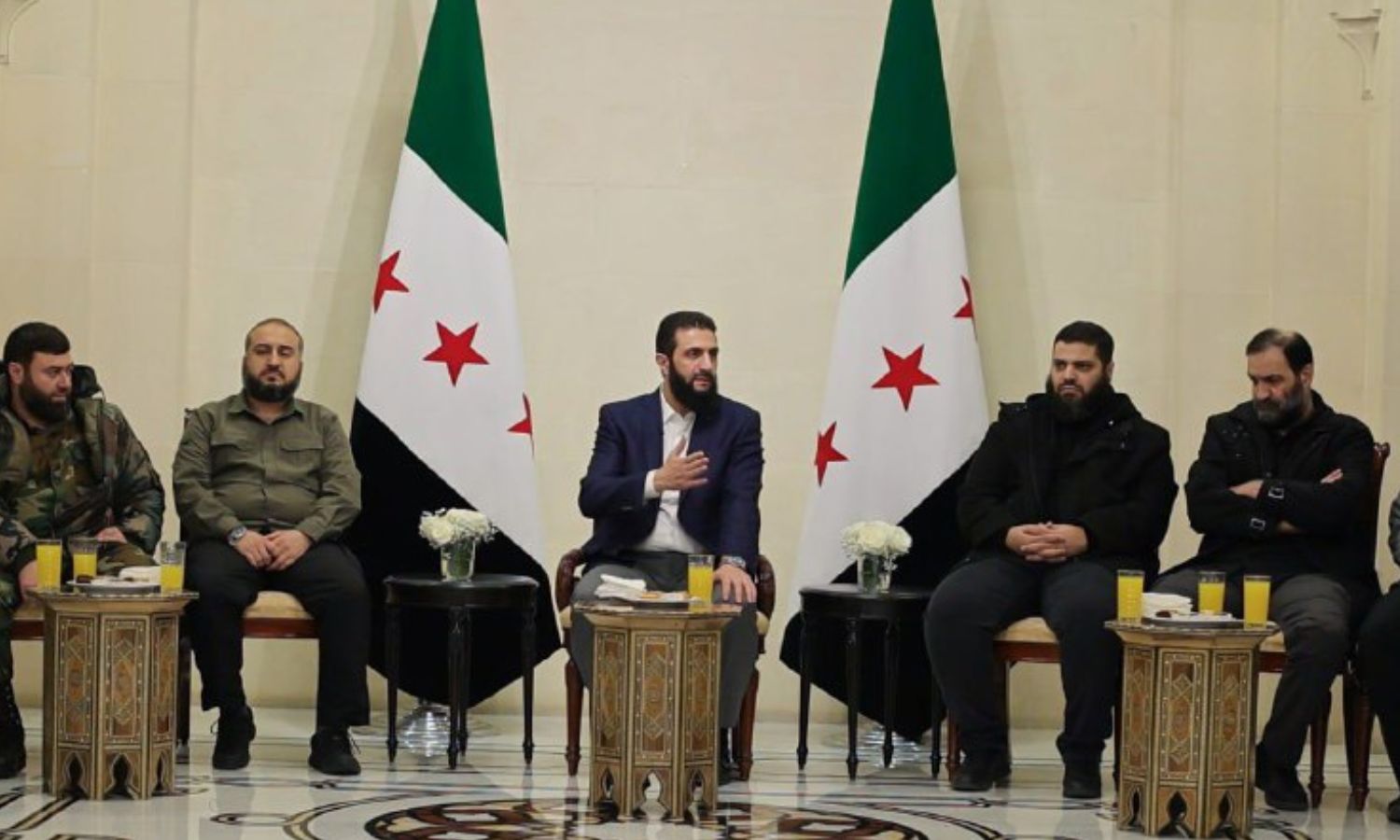
Commander of the Military Operations Administration Ahmed al-Sharaa in a meeting with a leader of Syrian opposition factions – December 24, 2024 (General Command – Syria)
Less than a week after the fall of the Assad regime, Resolution 2254 was present in the outcomes of the final statement from the Aqaba meeting, which took place on December 14, with the participation of foreign ministers from Jordan, Saudi Arabia, Iraq, Lebanon, Egypt, as well as the Secretary-General of the Arab League, the foreign ministers of the United States, Turkey, the United Arab Emirates, Bahrain, Qatar, the UN special envoy to Syria, and representatives from France, Britain, and Germany.
The statement emphasized support for a peaceful, Syrian-Syrian political transition that encompasses all political and social forces in Syria, including women, youth, and civil society, fairly represented, and led by the United Nations and the Arab League, according to the principles, objectives, and mechanisms of Security Council Resolution 2254.
The statement also included support for the role of the UN envoy to Syria, and a request for the UN Secretary-General to provide him with all necessary capabilities and to begin work on establishing a UN mission to assist Syria in supporting and sponsoring the transitional process and helping the Syrian people achieve a political process led by Syrians in accordance with Resolution 2254.
On December 23, a Qatari delegation arrived in Damascus and met with Ahmed al-Sharaa. The Qatari Minister of State, Mohammed bin Abdulaziz al-Khulaifi, emphasized the necessity of ensuring Syria’s unity and working toward a peaceful transfer of power through a political process that includes all segments of the Syrian people, based on Security Council Resolution 2254.
After Ahmed al-Sharaa called on December 16 to update the resolution, Pedersen acknowledged the next day the difficulty of its implementation, indicating that there was no real possibility to apply it following the fall of the Assad’s regime, noting a widespread agreement that Resolution 2254 cannot be implemented under the new circumstances, pointing out that the resolution identified two parties, one of which has been overthrown and cannot participate in a political process, without negating the necessity of a political transition through an inclusive internal Syrian process.
Dr. Zaidoun al-Zoubi, an expert in quality management and governance, explained to Enab Baladi that Resolution 2254 has lost its legal foundation; its second clause requires defining the opposition, but with the fall of the regime, there is no longer an opposition and regime. However, the resolution has not lost its political pillars, meaning that there is still a need for a political process, political transition, elections, and a constitution. In essence, there is a demand for a non-sectarian political body, which keeps Resolution 2254 alive with its clauses.
For his part, lawyer Michal Shammas considered that the international Resolution 2254 gains significant importance today in light of the conditions and changes that have occurred in Syria after the fall of the Assad regime.
This importance comes from applying the spirit of the resolution rather than adhering to it literally, namely conducting dialogue between political, societal, and civil forces and the new authority to form a transitional government with executive powers to lead the country during the transition period, working to secure security, disarm rogue elements, meet people’s needs, and ensure the orderly functioning of authorities, as well as reconstituting police, security, and national army forces based on national principles, all of which should be accountable to the judiciary and refrain from intervening in politics, with their only role being to maintain security and protect people and state borders.
According to Shammas, the transitional government would work to elect a body or founding committee charged with issuing a party law, an elections law, and drafting a new constitution that upholds people’s rights and freedoms, especially the rights of women and children, which would then be put to a public referendum. Upon approval, parliamentary and presidential elections would be held.
Regarding the obstacles facing the implementation of the resolution, the first, according to Shammas, is that the new authority has yet to disclose its intentions and vision for Syria’s future, still evading genuine participation of civil society forces in shaping Syria’s future, merely communicating with the leaders of sects and tribes, which is a negative indicator.
Thus, the importance of community, political, and civil mobilization comes to pressure the current authority to respond to citizens’ demands. Shammas asserts that holding a national Syrian dialogue conference would not contradict the spirit of Resolution 2254 as long as this conference includes representation from all Syrian political forces, including the current authority, electing a government that represents everyone to lead the transitional phase.
It is crucial that if the current authority insists on monopolizing power and ignoring the demands of Syrians, a new resolution should be issued by the United Nations Security Council obligating the new authority to implement the spirit of international Resolution 2254, considering that the Assad regime is no longer in place and should therefore be excluded from any political process.
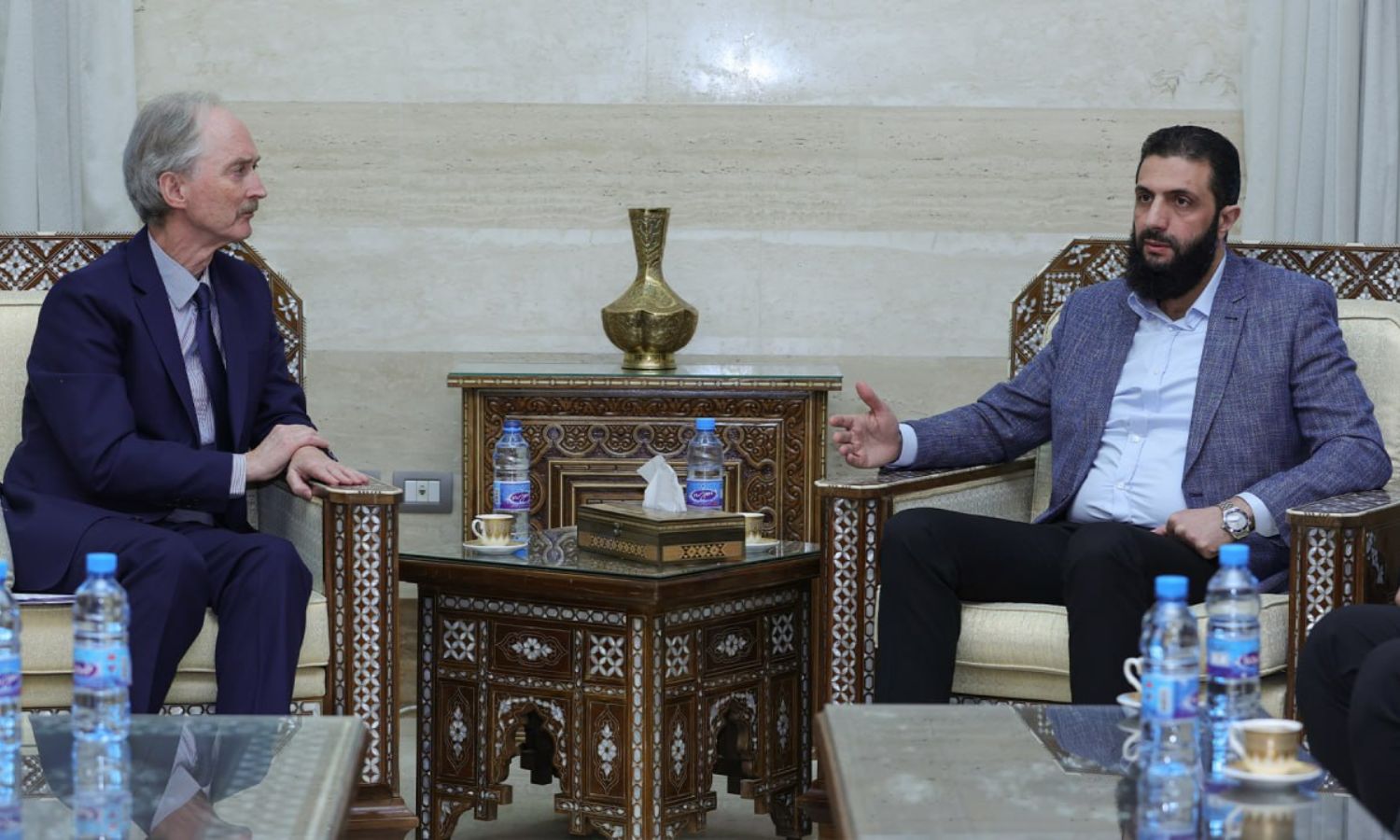
Commander Ahmed al-Sharaa during a meeting with the UN envoy to Syria, Geir Pedersen – December 15, 2024 (General Command)
The international resolution 2254 has gone through several phases since its adoption in December 2015, being issued as an executive definition of the Geneva Statement, which is the legal document issued by the Security Council that discusses organizing the political process, especially in its fourth article, according to the Director of Research at the Omran Center for Strategic Studies, Maan Talaa.
The fourth article consists of two parts, one related to establishing a credible non-sectarian government, and the other regarding organizing elections and drafting a new constitution.
According to Talaa, the resolution entered a phase of confusion or stagnation due to the continuation of military operations by the previous regime in 2016 and the exit of Aleppo from the equation after his forces took control of it with Russian-Iranian support in December 2016.
Afterward, the resolution was referenced again in 2018 through reviving the idea of the constitution or the constitutional drafting committee, bypassing the part regarding the establishment of a credible non-sectarian government and moving towards implementing the part related to the constitution, according to Talaa, who indicated that the constitution was discussed in Geneva but what was applied was what was discussed in the Sochi conference in 2018.
The Syrian Constitutional Committee (SCC) held its first sessions in October 2019 and managed to hold only eight sessions, consisting of three delegations (50 from the regime, 50 from the opposition, 50 from civil society) aimed at drafting a new constitution for Syria according to the United Nations Resolution 2254, which stipulates forming a transitional governing body and organizing new elections.
Maan Talaa sees that the phase through which the resolution has passed has completely overridden it due to the changes that have occurred in the Syrian scene, especially the alteration of the military landscape through the regime’s allies, namely Russia and Iran, expanding their control over de-escalation zones, increasing signs of Arab normalization with Bashar al-Assad, the COVID-19 crisis, and the February 2023 earthquake. Additionally, there has been a shift in the context governing the political process and the consideration of post-political process requirements, early recovery issues, and the subject of the return of refugees.
The de-escalation zones were defined by the sponsors of the Astana agreement in the fourth round on May 4, 2017, which stipulated the establishment of four safe zones in Syria, including Idlib governorate and certain parts of the adjacent governorates (namely Latakia, Hama, and Aleppo), rural northern Homs along with Eastern Ghouta in rural Damascus, and the southern governorates of Quneitra and Daraa.
The de-escalation agreement signifies that there would be no battles between the regime and opposition factions and that heavy weaponry would not be used within the geographical boundaries of the agreement.
However, the previous regime launched consecutive military operations against these areas, displacing residents of the de-escalation zones after gaining control over them in Ghouta, southern Syria, and rural Homs; it also took control over areas in rural Idlib and Aleppo, until its military advance stopped on March 5, 2020, following an agreement between Erdoğan and Putin.
According to Talaa, the resolution 2254 has been out of service or “clinically dead” since before the fall of the previous regime. An attempt was made to revive it in the final moments of the old regime’s collapse by agreeing to present “2254” and having the previous regime present during the discussions in Doha that were held in conjunction with the Doha Forum, where Pedersen was present.
There was once again talk about reshaping a transitional governing body with full powers and the complete activation of “2254.” However, the context of military operations was faster than any agreements, and with the fall of the regime, there was adherence to the resolution as a mechanism to ensure that a new authority would not emerge or to deal with the form of power that reached Damascus. At this point, some countries and factions of the Syrian opposition started to cling to “2254.”
The countries and parties advocating for adherence to “2254” consider it a framework for organizing political work. However, “in practice, (2254) has completely fallen because one of its parties has collapsed, and there is now a different context and a new regime. The countries that previously held on to the resolution have begun to adapt to this situation and engage diplomatically with the new authority, starting to look for another context to support stability in Syria and related issues,” according to Maan Talaa.
Talaa pointed out that there are ramifications of “2254,” part of which is linking sanctions and reconstruction to the political process rather than its elements as outlined in “2254.” This means that there must be a political process leading to a political dialogue that results in a constitution, which is also linked to the behaviors of the new administration.
Talaa suggested that in all the transformations of the process that “2254” has witnessed, it can be said that its legal effect has ended due to the change in context and the absence of reasons for conflict, considering that it was between a regime and opposition.
We are talking about a completely new political reality that is linked to the requirements of the transitional phase, requirements organized by the Syrians themselves under a purely Syrian leadership that starts with a dialogue conference, from which some measures related to the impact of constitutional life emerge.
Maan Talaa, Director of research at the Omran Center for Strategic Studies
Earlier, the UN envoy to Syria reaffirmed that there are international signals indicating that broader measures could gain momentum with progress in the political transition, which will be key to ensuring that Syria receives the economic support it needs.
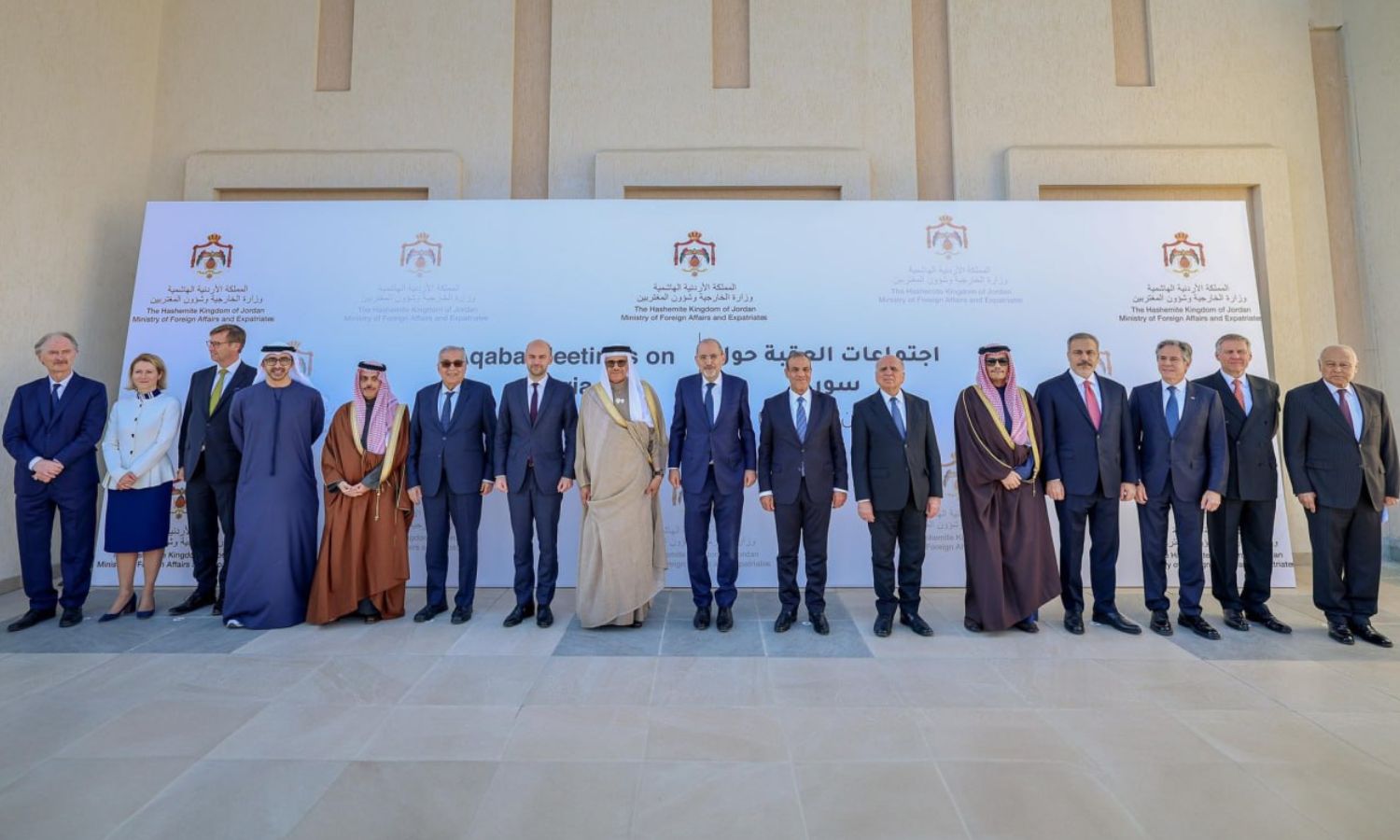
Foreign ministers of the member states of the Arab Liaison Committee on Syria meet representatives of Western countries and the UN envoy to Syria in Aqaba – December 14, 2024 (Jordanian Foreign Ministry/X)
The debate around the resolution raised questions about the new administration’s response to full or partial implementation and its impact on Syria, particularly regarding international recognition of the government in Damascus, lifting sanctions, and engaging in reconstruction and development.
Syrian researcher Nader Khalil believes that it is not in the interest of the “new Syria” to stubbornly refuse to implement what can be executed from Resolution 2254, especially with the regional and international will toward implementing the clauses related to forming a transitional governing body that allows for a political process, producing a power that genuinely represents Syrians through a properly regulated electoral process.
There is momentum behind the new Syrian administration from Western and regional countries, with clear signals towards the necessity of implementing the UN resolution in favor of a transitional political process. The previous regime has become a thing of the past, and no one wants to involve it in the future, as this is rejected by various parties.
If the new Syrian administration refuses to implement what can be enacted from the resolution, it will send a negative signal to the regional and international community that it wants to monopolize power, which means the continuation of international sanctions or their reinstatement, should the suspension of such sanctions discussed by some countries go into effect, according to researcher Nader Khalil.
According to Khalil, it is in the interest of all Syrians to move toward implementing the UN resolution, as it paves the way for a political process that allows Syrians to select their representatives in power, lift sanctions, integrate with the regional and international economy, and move towards reconstruction without any constraints.
Khalil noted that the new administration appears to be aware of what is required and has shown its openness to implementing “2254,” provided it is adjusted to align with the current reality.
With the exception of negotiations between the regime and the opposition, the other clauses related to implementing a transitional political process that enables the establishment of a constitution and holding parliamentary and presidential elections under international supervision are available for implementation, and it is in the interest of all Syrians to apply them.
It is likely that most regional and international powers will welcome a middle-ground approach to implementing this resolution, while stubbornness and refusal to apply it would reflect “catastrophic” repercussions on Syria, according to researcher Nader Khalil, resulting in its international isolation and the continuation of sanctions, which is something the Syrian people do not wish for and cannot bear given the political, economic, and structural realities in the country.
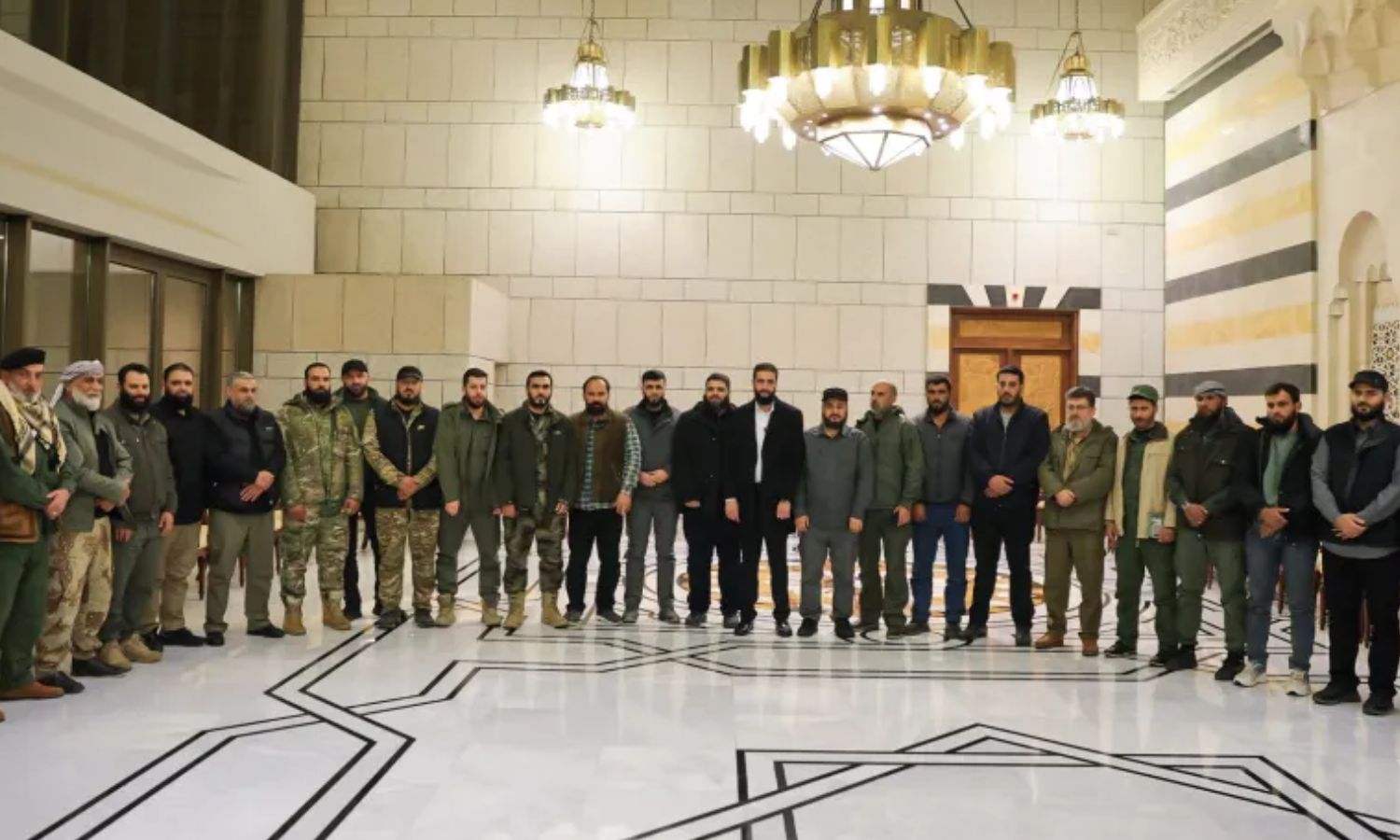
Commander of the General Command in Syria, Ahmed al-Sharaa, with military personnel from the Syrian factions – December 21, 2024 (General Command)
if you think the article contain wrong information or you have additional details Send Correction